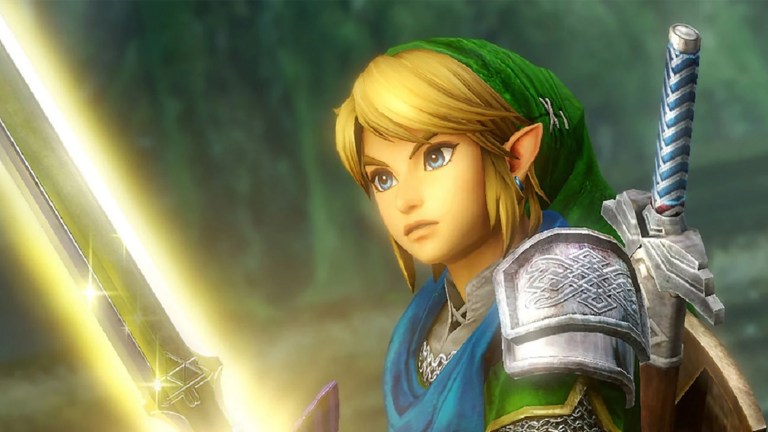The Legend of Zelda: Why Link Never Speaks
Link is one of gaming’s most iconic silent protagonists, and like all silent heroes, there are several reasons why audiences never hear him talk.

There are two kinds of heroes in the world of video games: those who talk, and those who don’t. Some protagonists start their lives as quiet characters and eventually graduate to speaking roles, but The Legend of Zelda’s Link has always remained the strong, silent type.
While voice acting has become the norm in video games, Nintendo’s landmark series The Legend of Zelda has primarily stuck to its non-voiced roots. The franchise only recently started exploring voice acting with The Legend of Zelda: Breath of the Wild via voiced cutscenes, and yet despite all of the characters talking around him, Link never utters a word in the game except for the usual grunts of “Hyut!” and “Hya!” While Nintendo is more than willing to get with the times when it comes to the rest of the Zelda cast, Link is seemingly stuck in the past. However, the company has its reasons for keeping the Hero of Hyrule’s voice under lock and key.
Technically, Link Has Talked Before
Now, before we actually discuss why Link doesn’t speak, we have to get an elephant-sized technicality out of the way: Link doesn’t speak in Legend of Zelda games, but you’ve seen him hold conversations with other characters before. For instance, in The Legend of Zelda: Ocarina of Time, players can respond to simple questions with a “yes” or “no,” and while one could argue that Link just answers by nodding or shaking his head, that doesn’t explain how Zelda learns Link’s name after asking him for it. Either Link wears an invisible name tag only Zelda can see, or the game not-so-clearly implies he told her.
Later Zelda games have utilized branching dialogue. The choices never impact the narrative, but titles like Skyward Sword and Breath of the Wild let players pick different responses. While Link doesn’t actually say anything via speech bubble, NPCs react differently depending on what players choose, implying that Link is actually saying something.
Even when Link doesn’t talk to other characters, the Zelda franchise is full of examples where Link either talks to himself or gives audiences a peek at his thoughts. In Zelda II: The Adventure of Link, Link occasionally describes what he sees and does, and in Link’s Awakening, the mural that explains the nature of Koholint Island is followed by ellipses, which are then followed by the words “What? Illusion?” While somewhat unclear, this segment indicates Link reads the message out loud and then expresses his confusion to audiences.
Meanwhile, when players interact with Paya’s Diary in Breath of the Wild, the game text reads, “It looks like Paya’s Diary. Must not look… Must not look…” Either the dialogue writer was extra cheeky when they created that segment, or gamers get to see Link trying to convince himself to not read the diary, either out loud or internally.
So, while Link generally doesn’t speak out loud, the games make it all-to clear that he isn’t mute. And yes, we did also hear him talk in the Zelda animated series from the late ’80s and in the Philips CD-i games from the ’90s, but these aren’t exactly canon Nintendo adventures. Plus, the the less said about those the better.
Players Are Supposed to Put Themselves in Link’s Boots
Now that that’s out of the way, it’s time to answer the question why doesn’t Link speak in the Legend of Zelda games. From an immersion standpoint, the answer is unsurprising.
In 2017, ZackScottGames sat down with Zelda creator Shigeru Miyamoto and producer Eiji Aonuma and asked them several questions regarding the then-upcoming Breath of the Wild. The first series of questions revolved around Link and what makes his Breath of the Wild incarnation stand out from different iterations. Aonuma explained that even though Link is the game’s main character, he doesn’t have a character to speak of.
A cornerstone of Link’s design is that every player should relate to him but still, as Aonuma put it, “play as themselves.” Miyamoto expanded on this sentiment, explaining that when gamers play Zelda games, they should consider what choices they want to make, but as they do, they also become more “in tune with Link.” ZackScottGames asked if that meant “the player is Link” and Aonuma confirmed that not just for Breath of the Wild’s Link but for the series in general.
Whenever studios want audiences to see themselves in the protagonist, they generally don’t give said character a voice. Players are supposed to make all the decisions for the character and imagine whatever voice they want coming out of their lips because developers want them to feel they are the hero. Link’s lack of a voice fits perfectly with this design philosophy. In other words, Link is meant to be an avatar for the player.
What Is the In-game Explanation?
Of course, not giving Link a voice is fine from a game design perspective, but it’s still weird for him to remain silent when everyone else around him talks, especially in Breath of the Wild where characters have spoken lines. In order for Nintendo’s decision to make sense, this idea also has to make sense from an in-game lore perspective, and the game has that covered.
While many characters talk to Link in Breath of the Wild, few connect quite as deeply as Princess Zelda. If players find all of Link’s memories, they learn that Zelda initially didn’t like Link following her around as a bodyguard, despite the necessity of his presence. Link doesn’t talk in any of these interactions, and some characters even comment on his silence, but partway through the sequence of collectible videos, Zelda opens up to Link. Part of the reason she warms up to him is revealed in cutscenes that show Link saving her life, but another reason rests in Zelda’s diary.
On page five, the diary states that Zelda got Link to “open up,” and that she eventually asked him to spill the beans on his silence. Surprisingly, the diary claims he did. According to Zelda, Link never speaks because he thinks it is “necessary to stay strong and to silently bear any burden.” If we take the diary at face value, not only does this entry explain that Breath of the Wild’s Link is the strong, silent type because he doesn’t want anyone to worry about him, but it confirms that he does talk. It’s just that players never get to hear Link’s voice.
To be fair, this explanation only applies to the latest incarnation of Link. Almost every entry in the Legend of Zelda franchise stars a different character, even though they all sport the same name. While Links primarily only utter grunts and yells, some are slightly more vocal than others. Wind Waker’s Link is a prime example since he yells “C’mon!” whenever he wants someone to follow him, and if he is tailing someone and about to be exposed, he will mimic a cat’s meow to throw them off.
Even though Wind Waker’s Link is almost as silent as Breath of the Wild’s Link, it would be a stretch to assume they don’t speak for the same reasons. One is a 17 year-old knight destined to save Hyrule, and the other is a 12 year-old boy who wants to save his little sister.
Ultimately, Link is Schrodinger’s silent protagonist. He doesn’t have any voice lines, but each entry indicates that he does talk, despite never hearing him do so. This paradoxical characterization helps players insert themselves into Link’s shoes but also gives him a personality, despite not being designed with one.
